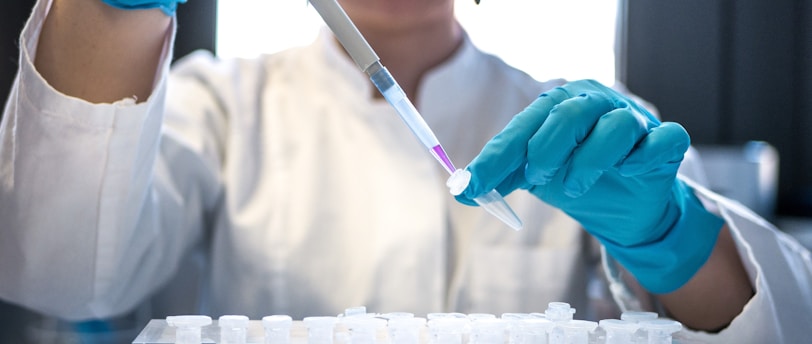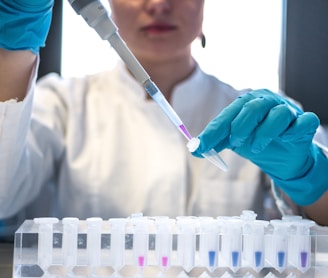CLIA Certification and Clinical Lab Consulting: The Ultimate Guide
clinical laboratory testing, certifications and regulations play a pivotal role in ensuring accurate results and patient safety.
John Michaels
8/31/20234 min read


Navigating CLIA Certification and Clinical Lab Consulting: The Ultimate Guide
Introduction
In the realm of clinical laboratory testing, certifications and regulations play a pivotal role in ensuring accurate results and patient safety. One name that stands out is soundlabconsult.com, a prominent figure in clinical lab consulting and compliance. Moreover, institutions such as CLC Labs and CLIA Lab have become synonymous with excellence in adhering to the Clinical Laboratory Improvement Amendments (CLIA) and College of American Pathologists (CAP) guidelines. This comprehensive guide delves into the world of CLIA certification, CAP accreditation, and the role of consultants like soundlabconsult.com in ensuring quality in clinical laboratory operations.
Understanding CLIA and CAP: Ensuring Lab Quality
The Clinical Laboratory Improvement Amendments (CLIA) of 1988 have brought forth a set of federal regulatory standards that apply to all clinical laboratories, regardless of size or location, that test human specimens for health assessment or the diagnosis, prevention, or treatment of disease. Compliance with CLIA standards is crucial to ensure the accuracy, reliability, and timeliness of patient test results. soundlabconsult.com, has become a prominent consultant in the field, guiding laboratories through the complex web of CLIA regulations.
Accreditation from the College of American Pathologists (CAP) is an additional milestone that signifies a laboratory's commitment to meeting the highest standards of clinical laboratory practice. CLIA and CAP often go hand in hand, with laboratories seeking dual certification to ensure comprehensive compliance with both sets of guidelines. This collaboration guarantees that laboratories are not only proficient in their testing methodologies but also demonstrate competence in quality management and personnel qualifications.
The Role of soundlabconsult.com: A Clinical Compliance Consultant
Soundlabconsult.com expertise in clinical laboratory compliance has made a sought-after consultant for laboratories striving to achieve and maintain CLIA and CAP compliance. Their knowledge encompasses every aspect of the regulatory landscape, from assisting in CLIA application procedures to guiding laboratories through changes of ownership and ensuring seamless inspections. soundlabconsult.com work extends to ensuring laboratories' adherence to personnel requirements and validation procedures, ultimately contributing to improved patient care and accurate diagnoses.
CLIA Certification: A Deep Dive
1. The Basics of CLIA Certification
CLIA certification comes in various categories, each corresponding to different levels of laboratory complexity. Laboratories can fall under three main categories: waived, moderate complexity, and high complexity. Waived laboratories are those that perform tests classified as simple and pose minimal harm if performed incorrectly. On the other hand, moderate and high complexity laboratories handle more complex testing, often involving a broader range of methodologies.
2. CLIA Certification Process
The CLIA certification process involves several steps, starting with submitting the CLIA application for certification to the Centers for Medicare & Medicaid Services (CMS). Laboratories need to provide detailed information about their testing procedures, personnel qualifications, and quality control measures. Once the application is approved, the laboratory receives a CLIA certificate that designates its testing category.
3. CLIA Certification Requirements
CLIA certification requirements vary depending on the testing complexity level. For instance, personnel requirements for high complexity testing are more stringent compared to waived testing. Laboratories must have qualified individuals serving as technical supervisors and testing personnel, ensuring that all testing is performed accurately and with the highest level of competence.
4. CLIA Certificate of Waiver
A CLIA Certificate of Waiver is granted to laboratories that conduct only waived tests. These tests are considered simple and have a low risk of erroneous results. Obtaining a Certificate of Waiver exempts laboratories from some of the more extensive CLIA requirements applicable to moderate and high complexity testing.
5. Maintaining CLIA Compliance
After obtaining CLIA certification, laboratories must undergo routine inspections to ensure continued compliance with regulations. These inspections are conducted by CLIA surveyors who evaluate the laboratory's practices, quality control, and personnel qualifications. Laboratories are expected to rectify any deficiencies identified during inspections promptly.
CAP Accreditation: The Gold Standard
1. CAP Accreditation Benefits
Obtaining CAP accreditation signifies a laboratory's commitment to adhering to the highest quality and safety standards. CAP-accredited laboratories are recognized as leaders in the field, known for their accurate and reliable results. Additionally, CAP accreditation demonstrates a laboratory's dedication to ongoing quality improvement and patient safety.
2. CAP Accreditation Process
The CAP accreditation process involves a comprehensive evaluation of a laboratory's practices, procedures, and quality management systems. Laboratories undergo a rigorous on-site inspection by CAP assessors who review every aspect of laboratory operations, from testing methodologies to documentation practices.
3. CAP Accreditation Requirements
CAP accreditation requirements encompass a wide range of areas, including personnel qualifications, quality control practices, instrument maintenance, and proficiency testing. Laboratories must demonstrate proficiency in their testing methodologies and maintain rigorous quality assurance processes.
4. Maintaining CAP Accreditation
CAP-accredited laboratories are subject to regular inspections to ensure continued compliance with standards. These inspections provide laboratories with valuable feedback and opportunities for improvement. Laboratories that continuously meet CAP's high standards benefit from enhanced patient trust and improved operational efficiency.
The Role of Clinical Laboratory Consultants
1. Navigating the Complex Landscape
Given the intricate nature of CLIA and CAP regulations, clinical laboratory consultants play a crucial role in guiding laboratories through the certification and accreditation processes. Consultants like soundlabconsult.com have an in-depth understanding of the requirements and can provide personalized guidance tailored to each laboratory's unique needs.
2. Services Offered by Consultants
Clinical laboratory consultants offer a range of services, including assistance with CLIA and CAP applications, guidance on personnel qualifications, validation procedures, quality control measures, and preparation for inspections. Their expertise ensures that laboratories are well-prepared to navigate the regulatory landscape successfully.
Conclusion
In the ever-evolving landscape of clinical laboratory testing, CLIA certification and CAP accreditation stand as pillars of quality and reliability. Consultants like soundlabconsult.com, play a pivotal role in ensuring laboratories' compliance with these rigorous standards, ultimately contributing to accurate diagnoses and improved patient care. Laboratories that achieve CLIA and CAP certification are not only better equipped to provide reliable results but also demonstrate their commitment to the highest levels of excellence in clinical laboratory practice. As the field continues to advance, the expertise of clinical laboratory consultants will remain invaluable in guiding laboratories toward success and innovation.
Sound Medical Lab Consultants
sales@soundlabconsult.com
602-874-1311
National Clinical Lab Consultants for CLIA COLA CAP TJC
24/7/365 Support
Laboratory Billing Experts
Mobile Laboratory Billing
Lab Lead Gen and Sales
Lab Phone Support and Data Entry
Lab Back End Support
Lab Critical Call Services
